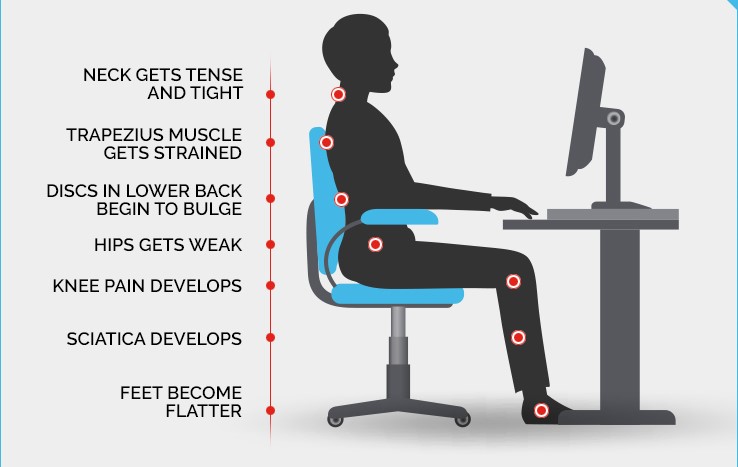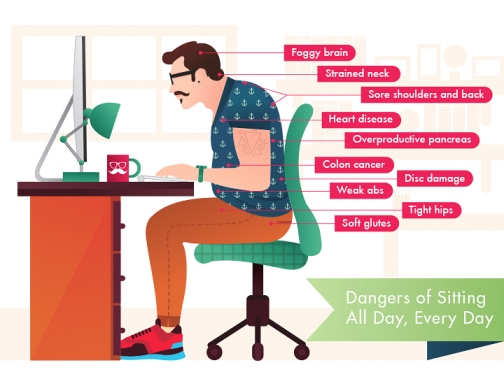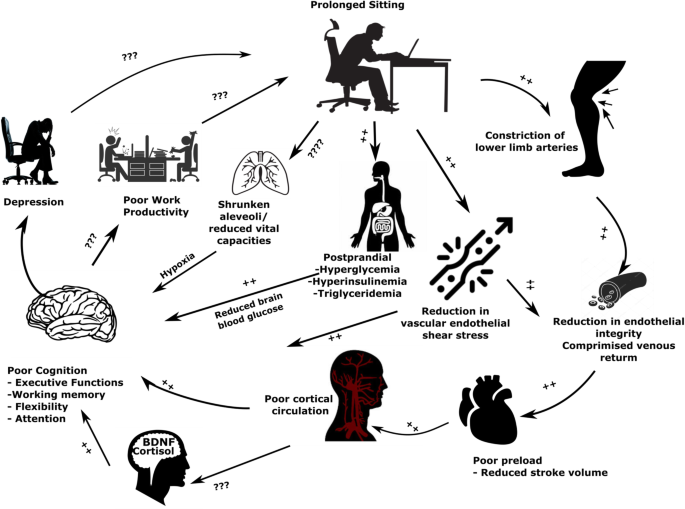A team of researchers has warned about the detrimental effects of prolonged sitting on, not just the entire body, but crucially, on brain health, noting that this is emerging as an increasingly established concern.
To counter the effects, they say that incorporating regular breaks that involve standing, walking or engaging in other physical activities throughout the day has become imperative.
Even brief, frequent interludes can promote blood circulation, elevate energy levels, and ameliorate some of the cognitive repercussions associated with prolonged sitting, the scientists say.
In addition, maintaining a well-rounded active lifestyle with regular exercise offers enduring benefits to brain health, they note.

Primary ways prolonged sitting hampers brain health
Sedentary screen time: Prevalence of screen-based activities accompanying extended sitting, whether for work, leisure or social interactions may compound the adverse effects on cognition and psychology.
Cognitive impairment: Linked to cerebral deficits including reduced attention spans, slower processing speeds and impaired memory which might be attributed to the sedentary lifestyle’s adverse effects on neuroplasticity, that is, the brain’s ability to adapt and learn.
Increased stress: Leads to heightened stress levels that triggers the release of stress hormones like cortisol, which, over time can result in memory issues and poor-decision making.
Brain atrophy: Connected to decrease in brain volume often associated with cognitive impairment given the link between brain atrophy and conditions like Alzheimer’s disease.
Reduced cerebral blood flow: Lead to drops in heart rate and blood flow resulting in diminished brain circulation that in turn may hinder focus and cognitive performance.
Mental health implications: A sedentary lifestyle that exacerbate signs of anxiety and depression, potentially lowering the production of mood-regulating neurotransmitters such as serotonin and dopamine.
Metabolic disorders: Associated with metabolic issues such as insulin resistance and obesity, indirectly affecting the brain and raising the risk of neurodegenerative disorders.
Reduced brain connectivity: Functional MRI research shows that prolonged sitting can disrupt brain connectivity, potentially impacting information processing and cognitive abilities.
Sleep disorders: Insomnia and other sleep disturbances may be linked to sedentary lifestyle affecting memory consolidation, cognitive performance, and overall brain health.
Limited physical activity: Prolonged sitting limits opportunities for physical activity vital for maintaining brain health through the release of neuroprotective substances like Brain-Derived Neurotrophic Factor (BDNF).
Inflammation: Prolonged sitting can trigger chronic, low-grade soreness throughout the body, including the brain, with implications for neurological disorders like Alzheimer’s disease.
Brain chemistry alterations: Can result in changes in brain chemistry, including reduced release of endorphins and other mood and cognition-sustaining neurochemicals.

Social isolation: May contribute to social isolation which can exacerbate loneliness and depression affecting mental health.
Poor posture: Extensive periods of sitting leads to neck and back pain which can negatively affect mood and cognitive function causing poor posture.
The researchers caution that it is essential to recognize that the experience of prolonged sitting can be unique to each individual and usually influenced by factors as age, overall health and lifestyles choices.
To counter these negative impacts, they advised that people should strive to incorporate more breaks and physical activity into daily routines, maintain good posture and adopt healthier lifestyle practices.
A balanced diet, regular exercise and sufficient sleep are all vital enhancing brain function and mitigating the detrimental consequences of prolonged sitting.


